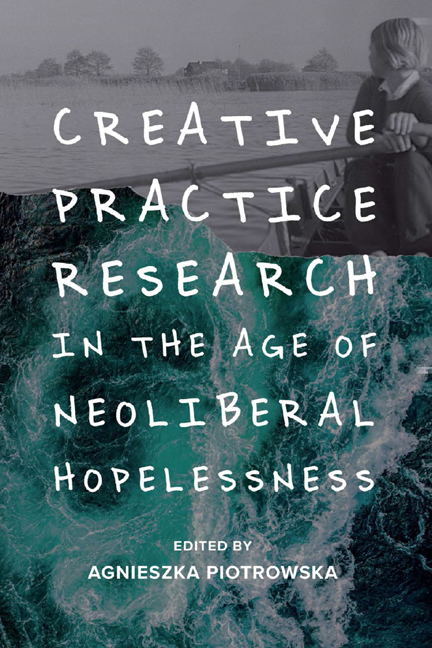Book contents
- Frontmatter
- Contents
- List of Figures
- Notes on Contributors
- Acknowledgements
- Preface: Life in the Post Pandemic Age
- Dedication
- 1 Introduction: Complexities, Compromises and Complicities
- 2 Against the Grain: Women Film Practitioners and Theorists Talk Creative Practice and Theory
- 3 Married to the Eiffel Tower: Notes on Love, Loss and Knowledge
- 4 Creativity and Neoliberalism: Between Autonomy, Resistance and Tactical Compliance
- 5 Tactical Compliance and the Persistence of Elsaesser
- 6 Storytelling and Game Playing
- 7 Autonomy and the Other Woman: Queer Active Agency and Postcolonial Expectations
- 8 From Neolithic to Neoliberal
- 9 First-person Expression on ‘Non-Western’ Screens: China as a Case Study
- 10 Scholarly Exploration of the Creative Process: Integrating Film Theory and Practice
- 11 Teaching Practice as Theory: Guerrilla Filmmaking
- 12 Baits of Falsehood: The Role of Fiction in Documentary or From Untheorised Practice to Unpractised Theory
- 13 Repented: A Creative Intersemiotic Translation
- Notes on Repented
- 14 How do you see me? The Camera as Transitional Object in Diasporic, Domestic Ethnography
- 15 ‘Shut Your Hole, Girlie. Mine's Making Money, Doll’: Creative Practice-Research and the Problem of Professionalism
- 16 Feminist ‘Pensive-creative Praxis’ and Irigaray: A Porous, Dialogical Encounter
- 17 The Paths of Creation, or How Can I Help my Dybbouk to Get Out of Me?
- 18 ‘We Want to Kill Boko Haram’: Reflections on the Photographic Representation of Children in a Displacement Camp
- 19 Between ‘Counter-movement’ (Ingold) and ‘Living with Ghosts’ (Demos)
- 20 Screen Memories: A Video Essay on Smultronstället/Wild Strawberries
- Index
16 - Feminist ‘Pensive-creative Praxis’ and Irigaray: A Porous, Dialogical Encounter
Published online by Cambridge University Press: 17 October 2020
- Frontmatter
- Contents
- List of Figures
- Notes on Contributors
- Acknowledgements
- Preface: Life in the Post Pandemic Age
- Dedication
- 1 Introduction: Complexities, Compromises and Complicities
- 2 Against the Grain: Women Film Practitioners and Theorists Talk Creative Practice and Theory
- 3 Married to the Eiffel Tower: Notes on Love, Loss and Knowledge
- 4 Creativity and Neoliberalism: Between Autonomy, Resistance and Tactical Compliance
- 5 Tactical Compliance and the Persistence of Elsaesser
- 6 Storytelling and Game Playing
- 7 Autonomy and the Other Woman: Queer Active Agency and Postcolonial Expectations
- 8 From Neolithic to Neoliberal
- 9 First-person Expression on ‘Non-Western’ Screens: China as a Case Study
- 10 Scholarly Exploration of the Creative Process: Integrating Film Theory and Practice
- 11 Teaching Practice as Theory: Guerrilla Filmmaking
- 12 Baits of Falsehood: The Role of Fiction in Documentary or From Untheorised Practice to Unpractised Theory
- 13 Repented: A Creative Intersemiotic Translation
- Notes on Repented
- 14 How do you see me? The Camera as Transitional Object in Diasporic, Domestic Ethnography
- 15 ‘Shut Your Hole, Girlie. Mine's Making Money, Doll’: Creative Practice-Research and the Problem of Professionalism
- 16 Feminist ‘Pensive-creative Praxis’ and Irigaray: A Porous, Dialogical Encounter
- 17 The Paths of Creation, or How Can I Help my Dybbouk to Get Out of Me?
- 18 ‘We Want to Kill Boko Haram’: Reflections on the Photographic Representation of Children in a Displacement Camp
- 19 Between ‘Counter-movement’ (Ingold) and ‘Living with Ghosts’ (Demos)
- 20 Screen Memories: A Video Essay on Smultronstället/Wild Strawberries
- Index
Summary
In this chapter, I draw on my own feminist audiovisual essay film practice to showcase the importance of practice for theory. I propose a novel reading of Luce Irigaray's philosophy of the caress and in particular her notion of the space in-between that shares concerns with film-philosophical theories and debates around creative practice research. Jennifer M. Barker's (2009) film-phenomenological work on porosity is particularly useful in this context. My central contention is that the metaphor of the ‘pores’ can serve as a catalyst to explore the embodied creative research process as an object of study and the role as researcher/ practitioner in this process. Said differently and for the purpose of this chapter, porosity allows me to consider three key ideas: permeability, imperfections and the potential that can arise from creative practice research – moving beyond traditional patriarchal scholarship towards what I term ‘feminist pensive-creative praxis’. I argue for an embodied methodology, drawing on Laura Mulvey's (2006) work as well as making use of Robin Nelson's (2013) understanding of ‘praxis’ as ‘theory imbricated within practice’, to suggest that this approach foregrounds the dialogical and creative interplay of the porous, dialogical encounter, as well as its political intent.
PORES AND THEIR ‘CLOGGING’
Pores are small openings in the skin that allow for sweat or oil to come to the surface, but they do not have muscles, so they cannot actively open or close. For Jennifer M. Barker (2009), pores manifest the notion of permeability, acting as a gateway to the very inside of the body, as well as the idea of the border of self and other. Above all, pores remind us of touch that is not just felt here or there but also in the spaces in-between. She notes: ‘[T]ouch is not just skin-deep but is experienced at the body's surface, in its depths, and everywhere in between … to a state of “total immersion”’ (Barker 2009: 2). This conceptualisation of touch that permeates the pores of the skin and which is felt both outside as well as deep inside the body is key for this chapter to foreground my understanding of creative practice research as a deeply bodily, sensual and sense-evoking experience. Parallels can be established between Barker's work and Luce Irigaray's philosophy of the caress (henceforth the Irigarayan caress) that have to date been overlooked for film-phenomenological research and creative research practice.
- Type
- Chapter
- Information
- Creative Practice Research in the Age of Neoliberal Hopelessness , pp. 242 - 257Publisher: Edinburgh University PressPrint publication year: 2020



